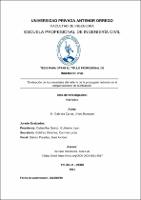Evaluación de los materiales del relleno de la presa palo redondo en el comportamiento de la filtración

View/
Download
(application/pdf: 19.78Mb)
(application/pdf: 19.78Mb)
Date
2021Author(s)
Cabrera Carlos, Jhon Jhonatan
Metadata
Show full item recordAbstract
Las presas de materiales sueltos son una de las estructuras más importantes y
complejas de ingeniería debido a su especializad técnica y costo importante para
su construcción, el nivel de seguridad es uno de los requisitos más importantes que
deben cumplir las presas, por lo tanto, es ineludible analizar y evaluar las
filtraciones que se pueden producir en estas estructuras y su impacto en la
estabilidad, pues su mal funcionamiento podría conllevar a desastres con grandes
pérdidas humanas, con alto impacto social, económico y ambiental.
La investigación realizada aborda la evaluación de los materiales de relleno de la
Presa Palo Redondo en el comportamiento de la filtración, para ello se analiza
mediante el escenario de Presa llena en operación, desembalse y llenado rápido y
operación de la Presa durante un año. A efecto de verificar la seguridad de la Presa
se analiza la estabilidad de talud en los escenarios de Presa construida, en
operación, llenado y desembalse rápido. Se utiliza el programa computacional
especializado en geotecnia MIDAS GTS NX en la cual se ingresa la geometría y las
propiedades de los materiales constructivos y de cimentación de la presa para
obtener los resultados de las filtraciones y esfuerzos a través de los factores de
seguridad de la presa en los escenarios evaluados. Los resultados de filtración y
estabilidad son adecuados para la seguridad de la Presa Palo Redondo.
En el Capítulo I se presenta el problema de investigación, los objetivos y la
justificación del estudio, en el Capítulo II se presenta el marco teórico a través de
la revisión de estudios realizados respecto a filtraciones y estabilidad de presas de
tierra, en el Capítulo se presenta la información de ingeniería de la Presa Palo
Redondo, en el Capítulo IV se señala la metodología utilizada en la investigación,
en el Capítulo V se presenta los resultados del análisis de filtración y estabilidad,
en el Capítulo VI se discute los resultados obtenidos respecto a investigaciones
similares. Finalmente se presenta las conclusiones y recomendaciones arribadas
en la investigación. Loose material dams are one of the most important and complex engineering
structures due to their technical specialization and important cost for their
construction, the level of safety is one of the most important requirements that dams
must meet, therefore, it is It is essential to analyze and evaluate the leaks that can
occur in these structures and their impact on stability, since their malfunction could
lead to disasters with great human losses, with high social, economic and
environmental impact.
The research carried out addresses the evaluation of the filling materials of the Palo
Redondo Dam in the behavior of the filtration, for this it is analyzed through the
scenario of Full Dam in operation, discharge and rapid filling and operation of the
Dam for one year. In order to verify the safety of the Dam, the slope stability is
analyzed in the scenarios of Dam built, in operation, filling and rapid discharge. The
computer program specialized in geotechnics MIDAS GTS NX is used in which the
geometry and properties of the construction and foundation materials of the dam
are entered to obtain the results of the leaks and efforts through the safety factors
of the dam. in the evaluated scenarios. The filtration and stability results are
appropriate for the safety of the Palo Redondo Dam.
In Chapter I presents the research problem, the objectives and the justification of
the study, in Chapter II the theoretical framework is presented through the review of
studies carried out regarding seepage and stability of earth dams, in the Chapter it
is presented The engineering information of the Palo Redondo Dam, in Chapter IV
the methodology used in the investigation is indicated, in Chapter V the results of
the filtration and stability analysis are presented, in Chapter VI discusses the results
obtained with respect to similar investigations. Finally, the conclusions and
recommendations arrived at in the investigation are presented.
Subject
Collections
- Ingeniería Civil [1260]

